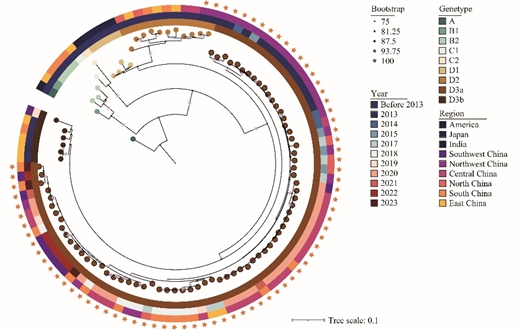Virus associated with severe HFMD found evolving with risks of outbreak: Chinese CDC

Molecular typing of 74 CVA6 strains isolated from severe HFMD in China, 2012-2023 Photo: Chinese CDC
A virus, called Coxsackievirus A6 (CVA6), associated with severe hand, foot, and mouth disease (HFMD), is evolving and presents a risk of outbreak occurrence, according to research from the Chinese Center for Disease Control and Prevention (Chinese CDC). An immunologist told the Global Times on Thursday that vaccines would be an effective form of prevention.
According to the research, CVA6 has emerged as a significant pathogen responsible for severe cases of HFMD. The study investigated 74 strains of CVA6 isolated from samples collected from severe HFMD cases between 2012 and 2023. The result shows that enhancing surveillance of severe HFMD is imperative.
HFMD is a contagious disease predominantly caused by several enteroviruses and primarily affecting infants and children, typically characterized by fever, mouth ulcers, and rash. HFMD symptoms are often mild and generally resolve within 7-10 days, according to the research. However, some individuals may develop severe symptoms including fever, a stiff neck, shortness of breath, and worsening rash, leading to potentially life-threatening diseases.
HFMD was classified as a notifiable disease in May 2008, originally enterovirus A71 (EV-A71) was identified as the predominant pathogen responsible for severe and fatal cases.
Zhuang Shilihe, a Guangzhou-based immunologist, introduced that enterovirus are a large category with more than 20 types of viruses that cause HFMD. EV-A71 is one of subtypes, just as the 9-valent HPV vaccine and the 2-valent HPV vaccine are both different subtypes of the HPV vaccine.
Although the widespread administration of an inactivated EV-A71 vaccine in 2016 significantly decreased the incidence of EV-A71-associated HFMD cases, the diversity of pathogens leading to severe HFMD has evolved recently due to the absence of cross-protection among different enterovirus serotypes.
Asking children to wash their hands and maintain hygiene does work, but vaccines remain the most effective method to control this kind of disease if the final verification confirms the research results in the future, Zhuang noted, adding that this, however, is not something that can be done in the short term.
Zhuang added that the findings are being presented because surveillance of diseases is on the rise, especially in recent years, with the emergence of a variety of viruses including the COVID-19 virus and influenza viruses.



